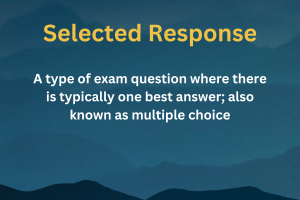
Taking the Praxis® doesn’t have to be intimidating. The grading process for these exams is straightforward and fair. Let’s explore how the Praxis® is graded so you can feel confident about how your exam is scored.
How Are Multiple Choice Questions Graded?
Some Praxis® exams are entirely selected response tests, while others are only partially multiple choice questions. The grading of these exams is simple. You get one point for each correct answer that you select.
The total number of correct answers added together provides your raw score. Your raw score is converted into a scaled score. Keep reading to learn how scaled scores work.
How Are Constructed Response Questions Graded?
Constructed response questions, also known as essay or short answer questions, require a human grader to rate your response. These graders are typically educators in the content area for the exam, so they are qualified to rate your answers.
First, it is important to know that “constructed response” is an essay or short-answer. The Praxis® constructed response questions are evaluated based on specific scoring guidelines or rubrics. These rubrics are developed to make sure scores accurately reflect your knowledge of the content being assessed.
Here’s a general overview of how these responses are scored:
- Rubrics: Each constructed response question is evaluated by criteria defined by a rubric. This rubric outlines the criteria for different score levels, usually on a point scale. The rubric details what is expected in a response to achieve a certain score, including content accuracy, the depth of analysis, use of relevant examples, organization of ideas, and sometimes the clarity of writing.
- Scorer Training: Scorers, often educators with expertise in the test subject, are trained to evaluate responses based on the rubric.
- Independent Scoring: Responses are scored independently by at least two trained scorers. This means that two different individuals will read and score each response without knowing the other’s score.
- Score Resolution: If the initial scorers assign different scores to a response, a third scorer or a scoring supervisor may review the response to resolve the discrepancy. The final score may be an average of the two scores or the resolved score, depending on the testing policy.
Does a Computer Grade My Essay Questions?
Sometimes, an automated scorer will grade your constructed responses. The software is informed by data from thousands of essay questions, so it’s an accurate way to easily score responses.
However, Praxis doesn’t rely only on automated scoring. This automated scoring system will only be one of the scorers with at least one human rater contributing to your overall score
The Core Academic Skills for Educators, or CASE, exam uses a specialized automated scorer called e-rater® as one of the graders.
How Are Mixed Format Scores Graded?
Many Praxis exams are mixed format, which means they have both selected response and constructed response questions. These can be graded a couple of different ways.
On some Praxis exams, the ratings you receive from your scorers are combined and added to your raw score. On other exams, the scores may first be multiplied by scoring weights, and these weights differ per question. Then those weighted scores are added to your raw score. On the CASE exam, if the human scorer and e-rater® agree, those scores are added to your overall raw score.
What Are Scaled Scores?
Scaled scores on Praxis assessments® (and any other standardized assessment) are a way of presenting the results of the test that accounts for differences in difficulty across various test forms and test sessions. This scoring method transforms raw scores—simply the number of questions answered correctly—into a uniform scale. The goal is to enable fair and meaningful comparisons of scores across different test-takers, test forms, and administration dates.
The purpose of scaled scores is to make fair and equitable comparisons and provide consistency over time:
- Fair Comparison: Scaled scores allow for fair comparisons among test-takers by standardizing scores across different test forms, which might not be equally difficult.
- Consistency Over Time: They provide a consistent basis for comparing test scores over time.
Did I Pass My Test?
Education Testing Service, or ETS, provides state education agencies with a recommended score for passing; however, not all states and approved teacher preparation programs use the same score. It is important to designate the state in which you are seeking licensure when you register for the Praxis®. Doing so makes sure your score report provides the Pass/Not Pass status for your particular state.
Still not sure? Check with the state licensing agency responsible for issuing licenses in your state to be sure you understand the appropriate test and its qualifying score.
How Do I Prepare for Praxis®?
Passage Preparation has taken the first big step in your preparation. We work with expert teachers and teacher educators to break down the broad and complex topics covered on each Praxis® exam and develop comprehensive study guides and interactive practice tests that we deliver as courses you can take on your own time.
Do yourself a favor and register for a Passage Preparation course aligned to the Praxis® test required in your state today.










